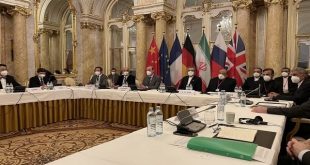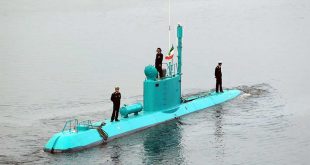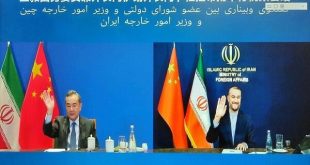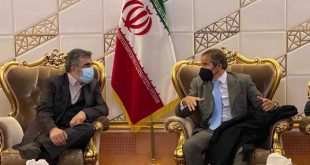Mousavi addressed reporters today after the European trio of signatories to the nuclear deal of 2015, officially known as the Joint Comprehensive Plan of Action (JCPOA), issued a statement earlier on the day to announce their decision to initiate the trigger mechanism.
He described the move as Europeans’ adoption of a defensive posture in the face of the US unilateral measures and intimidations, adding that the trio’s decision further exposed their vulnerability and lack of independence from the US.
“The mechanism for resolving disputes in the JCPOA was initiated by the Islamic Republic of Iran more than a year ago when Mr. Foreign Minister sent letters to the coordinator of the JCPOA Joint Commission, but nothing new has been resulted in terms of procedures or in action,” he added.
“In fact, European’s announcement for activating Dispute Resolution Mechanism and their reference to the Article 36 of the JCPOA is brought up in a sphere where the very same article had already been used by the Islamic Republic of Iran and therefore there is no new situation in sight,” Mousavi highlighted.
“However, if Europeans, who have claimed in their [today statement] that they are undertaking the move with good faith and well intention to preserve the JCPOA, keep their path of surrendering in front of the US rather than trying to deliver on their commitments and letting Iran benefit from the removal of sanctions according to the two annexes of the JCPOA, they have to ready themselves for the consequences which had already been cautioned about,” warned the Iranian diplomat, calling upon Europeans to further try to save the nuclear deal instead of giving in to the US bullying.
The European trio triggered the investigation into Tehran’s alleged breaching of the 2015 nuclear deal after Iran lifted limits on enrichment capacity over a year after the US discarded the nuclear deal and the Europeans failed to provide Tehran with any of the merits promised under the JCPOA.
Now, a fresh joint statement by Paris, Berlin and London insists Tehran had “no legal grounds to cease implementing the provisions of the agreement.”
Activating the mechanism – which is only possible if one or more signatories suspect a non-compliance with the deal – could eventually lead to the UN Security Council deciding whether to bring back sanctions against Iran.
Earlier in January, Iran announced that the level of uranium enrichment was to be determined by its own “technical needs.” However, both Tehran and the International Atomic Energy Agency confirmed that international inspectors are continuing their verification activities under the nuclear deal.
Following the decision, Iran’s UN envoy said in an interview that Tehran had meticulously followed the provisions of the nuclear deal even though it had received “almost nothing in return.” He added that the European parties to the JCPOA (from which Tehran expected to receive benefits) “didn’t act in accordance with the deal.”
Meanwhile, EU foreign policy chief Josep Borrell said triggering the mechanism isn’t about re-imposing sanctions. Its aim is “to resolve issues relating to the implementation of the Iran nuclear agreement,” he was quoted by Reuters.
Iran has previously warned against triggering the mechanism, with Mousavi insisting that by scaling back nuclear commitments Iran executed “its legal rights to react to America’s illegal and unilateral exit of the deal.”
The nuclear deal, brokered by six major world powers, saw Iran concede to dramatically reduce uranium enrichment and allow international inspections in return for the lifting of sweeping economic sanctions.
It ended up in jeopardy in 2018, when US President Donald Trump withdrew from what he called the “worst deal ever” and reinstated crippling penalties targeting Iran’s oil industry, banking sector and international trade.
Throughout 2019, Tehran had been gradually activating new centrifuges and enriching uranium to levels banned under the agreement, lamenting that European signatories failed to carry out their part of the deal. It was only after the assassination of Islamic Revolution Guards Corps (IRGC) Qods Commander Lieutenant General Qassem Soleimani in early January that Tehran decided not to abide by any of those limitations.
Iran’s foreign minister voiced skepticism over the appeal, writing on Twitter, “For 20 months, the E3 – following UK appeasement policy – has bowed to US diktat. That hasn’t gotten it anywhere – and it never will.”
Although the 2015 deal now hangs in the balance, Tehran made reassurances earlier this month that it has no interest in obtaining nuclear weapons. There is “no place for nuclear weapons in Iran’s defensive doctrine,” Iran’s ambassador to the UN said. Tehran is a member of the 1968 Non-Proliferation Treaty which aims for gradual nuclear disarmament and sets standards for arms control, the diplomat added.
https://chat.whatsapp.com/Fava5Ifru8330dDMfhs0gn
 WILAYAH NEWS VOICE OF THE GLOBAL AWAKENING
WILAYAH NEWS VOICE OF THE GLOBAL AWAKENING






